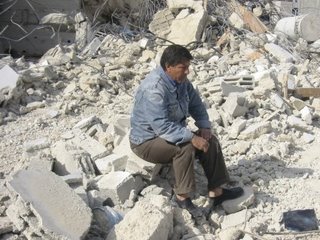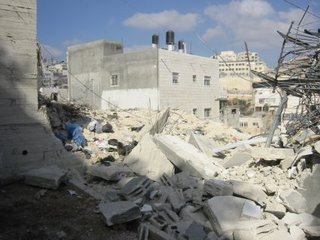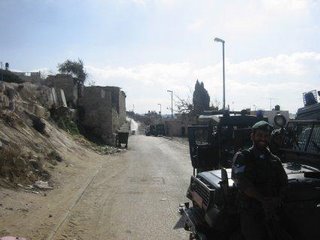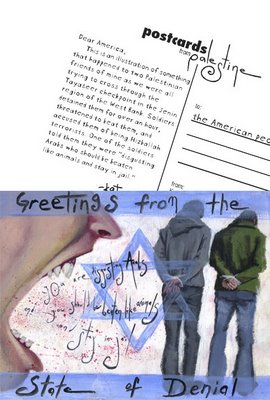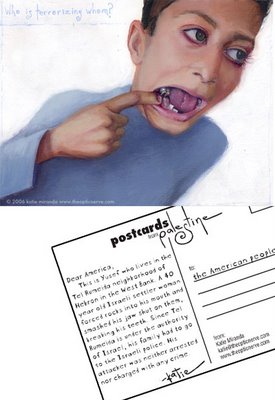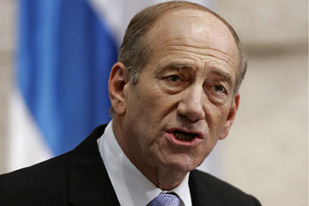Bangani Ngeleza and Adri Nieuwhof, The Electronic Intifada, 21 December 2005 A waterstation in front of an unrecognized village, 5 km from Bir Saba. Bedouin do not have access to this waterstation. (Photo: Ameer Makhoul)
A waterstation in front of an unrecognized village, 5 km from Bir Saba. Bedouin do not have access to this waterstation. (Photo: Ameer Makhoul)
Eighty thousand Palestinian Bedouin Israelis live in unrecognised villages in the Negev desert in the south of Israel. The villages are deprived of basic services like housing, water, electricity, education and health care. With the adoption of the Israeli Planning and Construction Law in 1965, 45 villages in the Negev were not declared as existing. Recently, Bangani Ngeleza and Adri Nieuwhof visited the region. They write about the serious consequences this has had for villagers in these "unrecognised villages".
The majority of the villages existed at the time of the creation of Israel in 1948 and some were established in the early 1960's when Israel evacuated Bedouins from northern Negev to the south of Beersheba. Comparisons between the experiences of Palestinian Bedouins in the unrecognised villages and black South Africans in the informal settlements in apartheid South Africa is striking. Apartheid policies in South Africa were adopted to ensure the priviliged position of white South Africans. Israeli government policies are targeted to secure the priviliged position of Jewish Israelis. A government that divides its people and deprives part of its citizens of basic human rights does not show a serious commitment to peace.
Unrecognised villages in the Negev
The 80,000 Palestinian Bedouins living in unrecognised villages in the south of Israel are citizens of Israel. They have the right to vote in national elections and when they have a job or operate a business it is their duty to pay taxes. The majority have lived for generations in villages on their land in the Negev. Following the adoption of the Planning and Construction Law of 1965, the villages did not appear on any Israeli map. They were not recognised by any official government and ignored by all government planning projects.
As there is no municipal authority that governs the villages, the Bedouin Palestinians cannot vote or be elected for municipal representation. Villagers are deprived of basic infrastructure and services like roads, sewage, running water, electricity, clinics, kindergartens and welfare services. The families in the villages mostly live in shacks under zinc roofs where the temperature can reach as high as 55 degrees Celcius. There is no authority that can decide upon permits for the construction of properties. The building of houses in the villages is therefore unlicensed and they are at all times under threat of demolition. A former captain of the Negev police remarked that "there is an imbalance since there is only a destroying authority and no authority issuing construction permits".1
Children
Half of the population of the Bedouins - about 40,000 - in the unrecognised villages is under the age of 18. In 2002, the infant mortality rate was 17.1 per 1000 births, as compared to the rate of 4.5 among Jewish infants. The absence of sewerage and garbage collection systems leads to unhygienic living conditions, a major cause of diseases among children.
Children of the unrecognised villages have to travel sometimes between 40 to 60 kilometres to school. They have to walk from the village to the main road to wait for transport. The majority of the children do not attend kindergarten, because there is no one in their village. This is against a law that rules that education is compulsory for four year old children. Specifically, the Compulsory Education Law requires the government to provide free and compulsory education for every child aged between 5 and15 years, regardless of whether a child has been registered in the Ministry of Interior's Population Registry or even if the child's parents are illegal residents. Israel's Ministry of Foreign Affairs proudly claims this as part of its commitment to social and welfare rights.2
Yet 40 per cent of the children drop out before finishing high school, and of the children who manage to go to high school only 27 per cent pass the matriculation exams.
Policy of removal
The policy of removal of Palestinians from Israel is as old as the creation of the state in 1948 and is illustrated by Prime Minister Ben Gurion, who said during a visit to Nazareth, "Why are there so many Arabs here? Why didn't you chase them away?"3
After lifting the military rule that was in force from 1948 to 1966 in the Negev and the Galilee, Israel's policy continued to target the removal of the Bedouin population. During this period, over 50,000 Bedouins were transferred to seven townships that were planned specifically for this group. The townships are densely populated and uprooted the Bedouin families from their traditional way of life. The "concentration towns" are the poorest and most neglected towns in Israel. In the process of removal the land belonging to the Bedouin families was confiscated.
In April 2003, a six-year plan was approved by Sharon's government with the stated aim to change the population's condition, settle land disputes and bolster law enforcement in relation to the Bedouin sector in the Negev. The plan was developed without consulting the Bedouin community in the Negev. In practice, the focus of activities within the plan for the coming years is "enforcement", which means massive house demolitions.
Large sums of the budget are allocated to the Israeli police force. The cabinet of Sharon approved a $250 million budget to force Bedouins from 45 unrecognised villages to leave their homes. At the same time, the government is planning the development of new Jewish settlements throughout the Negev. According to fieldworkers of the Regional Council of Unrecognised Villages in the Negev, every week a few shacks are demolished by Israel's giant Caterpillar bulldozers. The strategy is to demolish a few houses there, avoiding large scale demolition of villages. The message to the Bedouins is that they had better move soon or be removed forcefully.
Informal Settlements in South Africa
The existence of informal settlements in South Africa today reflects an apartheid legacy that stripped Africans of their right to live where they wished. It will take the present government years and significant amounts of capital investment to address the housing backlogs.

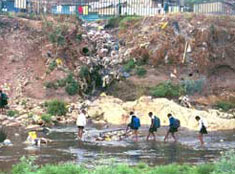
There are disturbing similarities in living conditions between unrecognised villages and informal settlements under apartheid. These include lack of access to adequate potable water, lack of proper sanitation facilities, absence of proper road infrastructure, the lack of educational facilities, houses built of corrugated iron sheets (in some cases of black plastics and cardboard) etc.
The similarities are striking between racially based policies that lay behind the creation of white settlements under the apartheid regime in South Africa then and the estabslishment of Jewish settlements by the Israeli government.
Policy Rationale in Apartheid South Africa
The policy of influx control was introduced in South Africa in the 1960's as a mechanism for limiting the number of black Africans within 87 per cent of the land area that was designated as "white South Africa" under the 1913 Land Act. This policy had three components: (a) the Group Areas Act, which prohibited Africans from being present in South Africa for more that seventy two hours without official permission; (b) labour bureaus, which matched African workers with specific jobs and then granted them the required official permission to work for a specific employer and live in a designated township; and (c) strict enforcement of the Group Areas Act.4 This policy was implemented with zeal by the apartheid regime, with an extraordinary number of 5.8 million prosecutions under laws restricting movement in the decade between 1966-75. Effectively, this policy restricted African citizenship to 13 per cent of the poorest land area that was declared as part of its so-called "homeland" policy.
Forced Removals
The influx control policy was pursued in South Africa through expulsions. These saw the forced removal of over 3.5 million black people (Africans, "Coloured" and Indians) during the 1960's, 1970's and 1980's. In the 1950's, over 600,000 people were forcefully removed from Johannesburg and dumped in a labour reserve/township, known as the Southwest Township (SOWETO) in overcrowded conditions. SOWETO was located 10 kilometres away from Johannesburg, initially with no amenities.
Forced removals also happened in Cato Manor (Mkhumbane) in Durban and District Six in Cape Town where 55,000 people were forcefully moved. The influx control policy meant that only those Africans that had permits to be in South Africa could remain within these reserves. Those who were found without such permits were regularly rounded up, detained and then trucked to the borders with homelands where they were dumped. This was effectively a measure to secure the demographic imperative of ensuring a white majority in the so called "white" South Africa. It was a policy similar to that of the Israeli government in securing a Jewish majority in Israel through mass expulsions.
The emergence of the informal settlement phenomenon
The repeal of influx control legislation during the last years of apartheid saw a movement of African people from the impoverished rural areas (homelands) to urban areas (which were erstwhile reserved for "whites") in search of a better life (employment, education etc). From 1976, the apartheid regime did not construct any new housing stock to accommodate black people in urban areas as part of its racial policies of limiting black movement. The result of this urbanisation phenomenon was the creation of shanty towns where people settled informally, in the backyards of township dwellings, in open spaces adjourning townships and closer to cities and in border towns next to homelands. In 1994, when the African National Congress government came to power in the country's first democratic elections, there was one housing unit for every 43 Africans as opposed to one for every 3.5 whites. The housing backlog was estimated at 1.3 million housing units, with between 7.5 and 10 million people in informal dwellings.5
The future of Israel lies in the end of apartheid
Apartheid policies in South Africa were adopted to ensure the privilaged position of white South Africans, as Israeli policies are targeted to secure the priviliged position of Jewish Israelis. A government that divides its people and deprives some of its citizens basic human rights does not show a serious commitment to peace. With the continuation of these divisive policies, it is difficult to take Sharon's rhetoric about working for peace seriously. The challenge for Israel is to arrive at a solution that will guarantee equality for all its citizens regardless of race, gender, religion and so on, within a democratic state. Pressure must be put on the state of Israel to abandon its apartheid policies, including its refusal to recognise the existence of villages composed of its own citizens living within its national borders.
The material conditions of Bedouins living in unrecognised villages brings into sharp focus the sense of outrage that moved Nelson Mandela who, on the occasion of the Rivonia trial in 1964 at which he and other ANC leaders faced the possibility of the death penalty said,
"I have fought against white domination, and I have fought against black domination. I have cherished the ideal of a democratic and free society in which all persons live together in harmony and with equal opportunties. It is an ideal which I hope to live for and wish to achieve, but if needs be, it is an ideal for which I am prepared to die".
Bangani Ngeleza and Adri Nieuwhof are independent consultants from respectively South Africa and the Netherlands. Ngeleza participated in the liberation struggle of the ANC to overcome apartheid in South Africa, and Nieuwhof supported the struggle as a member of Holland Committee on Southern Africa the ANC in achieving its goals.
Endnotes
[1] More information is available on the website of the Regional Council of Unrecognized Villages in the Negev: www.rcuv.org
[2] See Yoram Rabin, A Free People in Our Land: Welfare and Socio-Economic Rights in Israel, Israeli Ministry of Foreign Affairs (1 April 2005); CRC factsheet: Israel, CRC/C/8/Add. 44 (27 February 2002)
[3] A Middle East View by Mennonite Church Liaison (PDF), Glenn Edward Witmer (November 2005)
[4] The Instruments of Apartheid: Dealing with the "Black Threat"
[5] Richard Knight














